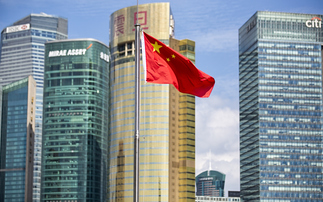China's burgeoning debt crisis could be killing off hopes of a shift towards a consumption-led economy. Annabelle Williams reports.
China has made headlines in recent years with the announcement of plans to shift the balance of its economy away from investment, and towards consumption. The blueprint for economic rebalancing was detailed in the 12th five-year plan, announced in 2011 and intended to run until 2015.
The news was greeted with enthusiasm by investors, many of whom spied opportunities in industries from fast moving consumer goods to luxury. But China's plans to change its economy have coincided with a massive growth in debt, which has begun to fuel a looming 'shadow banking' crisis.
Has the country's explosion in debt begun to squash authorities' plans for rebalancing?
A fall in rebalancing indicators has coincided with the burgeoning shadow banking crisis
Transitioning towards a consumption-led economy is based on three elements; a diminishing role for state-owned enterprises in the marketplace, urbanisation, and increasing domestic consumption.
Of the three, domestic consumption is the element most closely watched by investors. Household consumption only accounts for 35% of China's economy, compared to around 70% of the US economy.
"Focusing on the urban consumer and their discretionary spending is what will provide investor returns in the near future," explained Kunal Ghosh, manager of the Allianz BRIC Stars fund.
Rebalancing signs
Economists have come up with a range of metrics for assessing the rebalancing of China's economy, usually by measuring sales data against industrial output.
Anna Stupnytska, global economist at Fidelity Worldwide Investment, compares how fast retail sales are growing in real terms (adjusted for inflation) relative to the pace of growth in industrial production.
When the ratio moves above one, consumption is becoming a more important part of the economy and rebalancing is underway.
"You can look at GDP relative to investment, but it is not very timely, and not necessarily something that can pick up on current momentum," she explained.
The indicator has been volatile, but retail sales made up a greater proportion of the economy for several periods in the last few years, reflecting the beginnings of a move towards a consumption-led economy. But, since 2012, retail sales have not been growing faster than industrial production, and slowed even further this year.
The fall in the indicator has coincided with the burgeoning crisis in China's shadow banking sector. Rapid growth in off-balance sheet loans and the proliferation of complex wealth management products have helped create a new wealthy elite.
This group typically invested in property assets, which have risen sharply in value over the last several years, and this wealth has helped spur on retail sales to new highs.
Estimating the scale of credit growth is difficult, but various authorities suggest credit has grown by an average of 20% per annum. Shadow banking assets are believed to make up around a third of all credit in China, at a value of $3trn.
Debt crisis
As the number of wealth management products coming close to default rose sharply in the last year, the government moved to stem what many believe is the beginnings of a debt crisis.
Chinese authorities began giving cash injections of ¥100bn to each of the country's five largest banks at the end of September. The handouts will be made over a five month period, in a bid to shore up liquidity.
While the measures stop short of the full-scale quantitative easing seen in the West, the move demonstrates how tough conditions have become for Chinese banks, many of which are grappling with highly leveraged balance sheets.
This has followed moves to prevent defaults in the investment market. A widely expected default from a high profile $500m investment trust, called Credit Equals Gold No. 1, was avoided earlier this year when the trust was bailed out by an anonymous bidder - believed to be the People's Bank of China.
Balancing act
The problem facing the authorities now is that any attempts to prevent debt from spiralling out of control will likely dampen the consumption side of the economy.
Stupnytska explained: "It is a tight balancing act for the government to try to support growth from a cyclical perspective, but shrink imbalances in the shadow banking sector. The explosion of loans helped support growth, but we know it is not sustainable."
Although the latest figures for August 2014 show the indicator shot up to 1.4, reflecting a move in the right direction, the speed of the jump is unsustainable.
"It is quite a big adjustment, which suggests to me it is not possible to continue with such a high pace of adjustment, particularly if the government tries to support the economy on the downside," she added.
Although it has been a common theme for Western investors to buy consumer-focused stocks in anticipation of consumption growth, some managers are much more cautious on the prospects for the Chinese consumer.
Peter Jarvis, manager of the African Alliance Global Equity fund, said many people are underestimating the scale of the challenge facing China in shifting the economy towards consumption.
"We do not disagree that China is going through the process of moving towards a consumption-led economy, but people are ignoring the reality of the timescale. It is not going to be a multi-year process," he said.
The shadow banking sector is already having a material impact on the economy, and this is likely to have knock-on effects on other regional economies, particularly commodity producers.
"You can already see the impact of the slowdown because of the shadow banking crisis, in the iron ore price for example. The iron price has been falling, and while that is partly due to greater supply, the reality is, China is slowing down," Jarvis explained.
Corruption clampdown
Aside from the shadow banking crisis, China's clampdown on corruption is also limiting consumption.
The government was forced to intervene with anti-corruption laws which prevent the gifting of luxury goods, as the practice had become so embedded in Chinese culture that it was damaging the reputation of high-ranking party officials and prominent business leaders.
This clampdown has had an effect on sales of most international brands including Burberry, LVMH, Bulgari, and Prada. LVMH shares have fallen 9% over the 12 months to 22 October, while Burberry is down 4% over the same timeframe, as investors react to tougher conditions for luxury goods in China.
Allianz's Ghosh said China's two-year focus on rooting out corruption has caused a "dramatic" slowdown in economic growth.
"This may require drastic action from the leadership at a later date. The direct fallout of the anti-corruption measure and the controlling of bank loans is a slowdown in the property market, flight of domestic capital, and slowdown in foreign direct investment," Ghosh explained.
However, for those watching data in China, stripping out the practice of gifting luxury goods among the elite could make the true picture surrounding retail sales clearer. "From a long-term perspective, this is something that is much better," Stupnytska explained.
"From now on, consumption growth will be more efficient. When we look at retail sales, we will know it is something happening in the real economy, rather than sales supported by gift-giving among government members."
Renewed confidence
The renewed confidence from stamping out corruption will ultimately prove beneficial, said Ghosh.
"Eradicating the pervasive corruption will bring back confidence of the populace in the domestic economy, which is a must for a command economy like China. The benefits significantly outweigh any potential slowdown."
Ghosh feels the market's focus on small changes in China's projected GDP numbers means overlooking the economic benefits of rebalancing.
"Lower GDP growth is an indicator the country is on the right path for this long-drawn transition," he said.
"A service-orientated economy can provide 30% higher employment per unit of GDP growth, which immediately allows China to achieve its objectives with lower GDP growth. This is a point that investors have not yet become accustomed to."
Data mismatch
Although there may be long-term benefits to restructuring, some economists believe China's economy is slowing at a faster pace than the authorities would like. This perspective is at odds with the belief Chinese authorities are deliberately slowing the economy.
For example, rail freight volumes are negative year-on-year, electricity usage has fallen, and manufacturing data shows stagnation.
"This suggests headline numbers in terms of growth are overstating what is happening in the economy. There seems to be a mismatch between headline economic growth forecasts and what is happening underneath," said Hector Kilpatrick, chief investment officer at Cornelian Asset Managers.
An economy growing at a much slower pace will also be harder to rebalance.
"Whenever sources of credit are restricted there is clearly going to be a drag on economic growth as a result. The challenge will be restructuring while they have much slower growth."
Extreme scepticism
Steen Jakobsen, chief economist at Saxo Bank, believes the build-up of debt in China has become excessive and is sceptical about the government's ability to address the problem using targeted measures, such as September's liquidity injection.
He explained: "Previously, every [measure] was broad-based and cyclically-based, and now policy measures are pointing towards certain sectors, which is very difficult in a planned economy. Deciding to champion certain sectors is enormously complicated. I remain extremely sceptical."
He also noted that many wealthy Chinese are moving their capital overseas - a sign which could prove to be the canary in the coalmine. If this picks up pace the consequences could be dire.
"If China implodes so does the US… It will happen simply because the markets are interconnected," Jakobsen warned.














